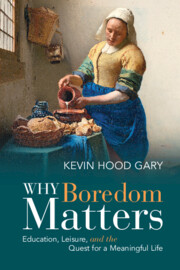4 - Leisure
A Cure for Boredom
Published online by Cambridge University Press: 21 July 2022
Summary
In this chapter, I examine the dynamics of contemporary so-called leisure, which is largely how we attempt to ameliorate boredom. With contemporary leisure what appears to offer self-renewal and self-actualization actually advances a form of blissful self-obliteration that enables the despair that Kierkegaard alerts us to. I then turn to an alternative conception of leisure, which draws inspiration from classical sources. This tradition, which has evolved and developed in several cultural eras, traces a line from Aristotle to St. Benedict of Nursia to Thomas Aquinas up to more recent leisure visionaries, including Simone Weil and Josef Pieper. Rather than enhancing self-restoration, these writers contend, the vacancy and inaction of free time are prey to acedia – a spiritual and mental sloth. The classical leisure tradition takes direct aim at this tendency, cultivating practices of leisure which protect the self from falling into despair. The argument here is that contemporary leisure, as it is often understood and practiced, offers a temporary anesthetic that in the end intensifies existential boredom and despair. True leisure, by contrast, restores and renews the self, offering a powerful antidote to existential boredom and the despair that afflicts the self.
Keywords
- Type
- Chapter
- Information
- Why Boredom MattersEducation, Leisure, and the Quest for a Meaningful Life, pp. 66 - 83Publisher: Cambridge University PressPrint publication year: 2022

